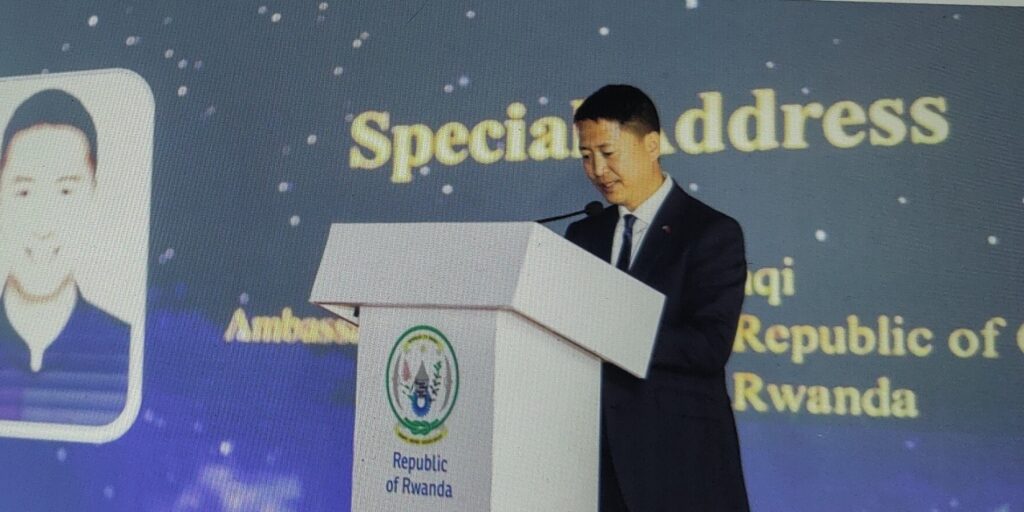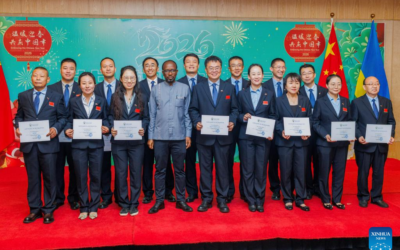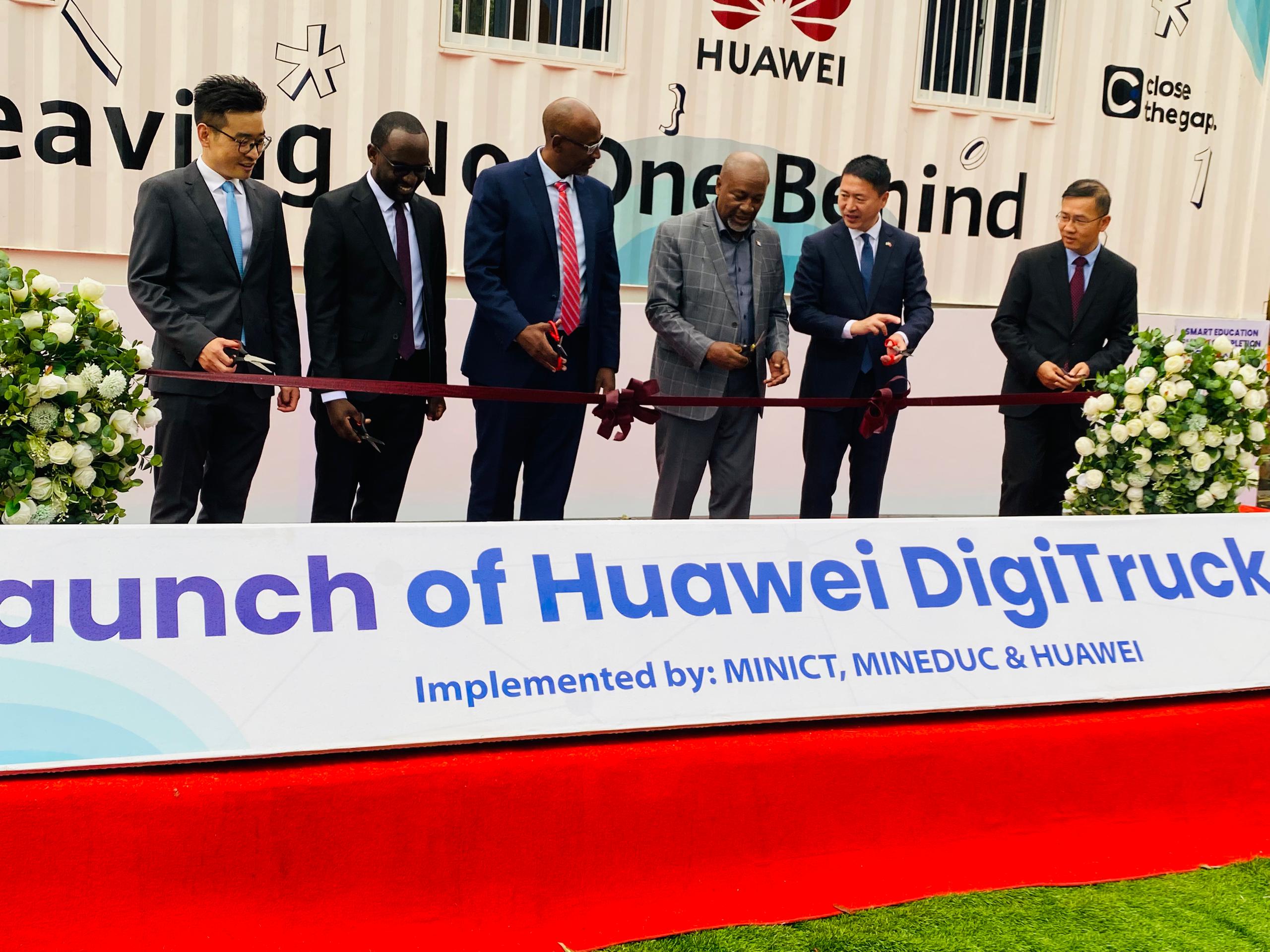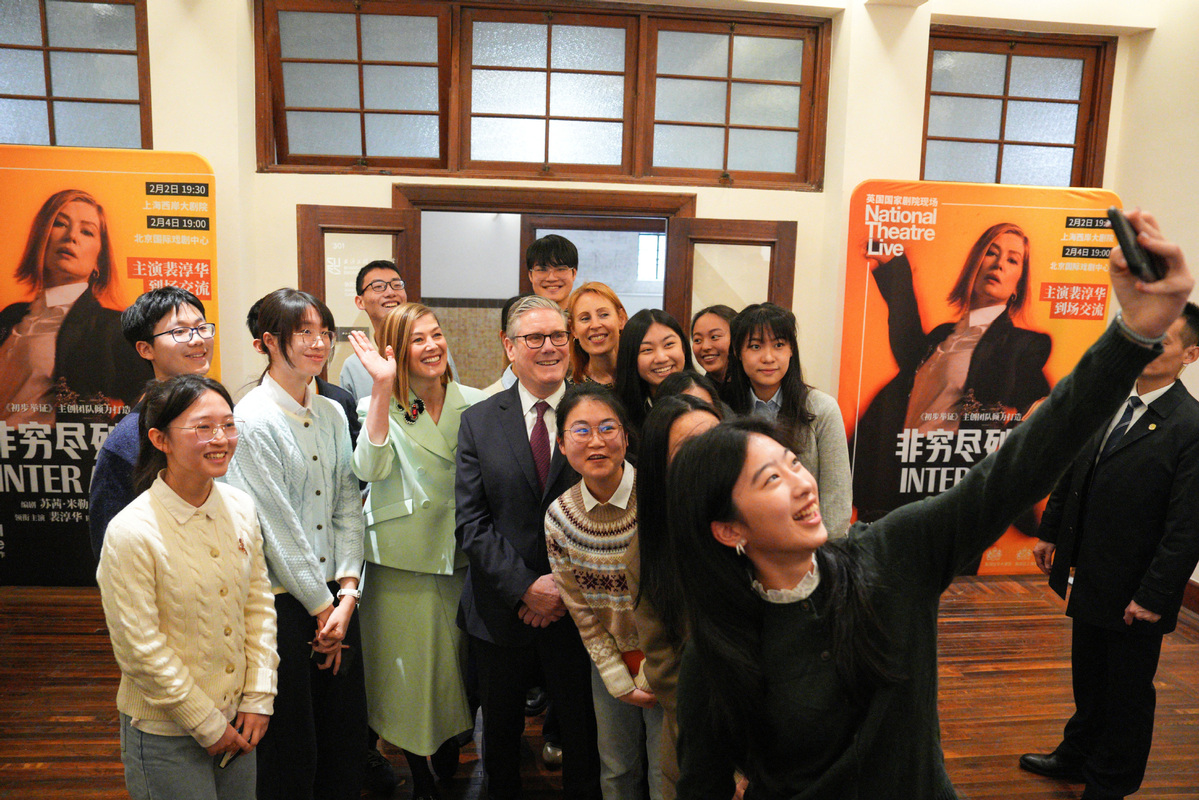Credit: @ Mike Urinzwenimana
By Staff writer
Rwanda, in collaboration with Huawei Technologies,on Friday, launched phase II of Rwanda Smart Education at Kagarama secondary school in Kicukirodistrict on the outskirts of Kigali city. Phase II of the project will connect additional 2,500 schools, establish 100 smart classrooms as well as putting up a national education cloud platform, which will promote digital learning. During phase I of the project, 1,500 schools were connected to high speed internet and two data centres were built.
During the event, a mobile solar powered classroom fitted with laptops and internet connection dubbed DigiTruck was also launched. Virtual class sessions connecting various schools spread in all provinces of the country were conducted aimed at testing the quality of internet which proved to be in excellent working condition.
The DigiTruck is expected to move across the country providing digital skills to communities including youth, women, and rural farmers. The initiative aims to empower over 5,000 Rwandans in three years, supporting NST2’s goal of equipping one million citizens with digital skills. The Occasion was officiated by the minister of education Joseph Nsengimana, and also attended by The RPF Secretary General Gasamagera Wellars, Chinese ambassador to Rwanda, H.E Gao Wenqi, Huawei Technologies Managing Director Jin Jiqing, Eraste Rurangwa, Permanent Secretary in the Ministry of ICT, Kicukiro district Mayor, Mutsinzi Antoine among others.
Minister of Education Joseph Nsengimana emphasized the role of technology in education, saying, “We must equip our youth with tools for the digital age.” He thanked Huawei and China’s International Development Cooperation Agency for their support, pointing out that the initiative aligns well with the National Strategy for Transformation II (NST2). Under the strategy, Rwanda envisages tone million people in digital skills. “Let us reaffirm our resolve that to ensure that no Rwanda is left behind in the digital transformation journey, minister Nsengimanaemphasized.
Chinese Ambassador H.E Gao Wenqi, reaffirmed China’s commitment, to Rwanda’s development, noting that “the successful completion of the Smart Education Phase I, vividly demonstrates the profound significance of integrating technology with education, building a digital bridge connecting over 1,500 primary, secondary and tertiary institutions, empowering more than 1.5 million students through digital enablement.” Ambassador Gao further noted that the launch of the Huawei DigiTruck project marks a new paradigm-shifting from fixed-point knowledge empowerment to mobile, inclusive educationaloutreach.

Ambassador Gao also highlighted the continued expansion of cooperative educational initiativesbetween Rwanda and China such as the LubanWorkshop at IPRC Musanze, and Heng Hua VacationalSchool. “Chinese enterprises operating in Rwanda have created over 18,000 local jobs, serving as vital platforms for cultivating scientific and technological talent in the country. Moreover, exchanges between universities and research institutions of the two countries have been growing steadily”, he said.
“To build a good state and lead the people, education comes first,” Ambassador Gao said quoting an ancient Chinese proverb, further adding that knowledge illuminates the path of the mind, and education lays the foundation for the future. He emphasized that the Chinese embassy stands ready to work with all sectors of Rwanda to deepen the implementation of the strategic consensus reached by China and Rwanda leaders and the outcomes of FOCAC, further advancing cooperation in education and other fields forthe benefit of the two nations and peoples.
Huawei Rwanda’s Managing Director Jin Jiqing,highlighted their youth programs, including Seeds for the Future and ICT Academy, which will enable to close the digital divide. He also highlighted that with support from the Ministry of education, Huawei has helped establish a nationwide network and advanced data centres connecting more than 1,500 schools including 270 in remote areas. “A girl in a remote village can explore the world’s most advanced knowledge with a tablet in her hands. These are the real impacts of digital inclusion, bridging distances, breaking barriers and giving every child to dream bigger,” Huawei Managing Director Jin Jiqing said.
Eraste Rurangwa, Permanent Secretary in the Ministry of ICT and Innovation, said, that the DigiTruck project is a gateway to opportunities, driving Rwanda’s vision of a knowledge-based economy.
Some of the students interviewed praised the project pointing out that technology is essential in the 21stcentury not only for learning purposes, but also to bring them to international levels and opens doors for them on the international stage to compete on the job market.
The Smart Education Phase is funded by preferential loans from the Export-Import (EXIM) Bank of China.








Sie erhalten eine E-Mail mit einem Link, um Ihre Anmeldedaten zurückzusetzen.
Casino.org ist die weltweit führende unabhängige Online-Gaming-Autorität, die seit 1995 vertrauenswürdige Anleitungen, Bewertungen und Informationen für Online-Casinos anbietet.
Ja, Casinoly bietet ein vielseitiges Bonusprogramm für neue und
bestehende Spieler. Dieser Prozess ist schnell und unkompliziert
online durchzuführen.
Das bedeutet, dass wir möglicherweise eine Kommission erhalten, wenn du dich über unseren Link bei einem
Casino registrierst und dort spielst. CasinoFM bietet dir einen kostenlosen Vergleich von Online Casinos,
durchgeführt mit reichhaltiger Expertise. Für Neukunden gibt es einen 100% Casinoly Bonus von bis zu 500€ und 200 Freispiele.
Auch die Umsatzbedingungen für den Neukundenbonus könnten etwas
niedriger sein, aber dass er auch im Live Casino gilt, finde ich toll.
Von hier aus gelangst du mit nur einem Klick zu allen wichtigen Unterseiten sowie deinem Spielerkonto.
Eine Einzahlung ist ab 10€ möglich, wobei Bitcoin mit dem Mindesteinzahlungsbetrag von 30€ eine Ausnahme darstellt.
References:
https://online-spielhallen.de/playfina-casino-mobile-app-dein-spielvergnugen-fur-unterwegs/
Betreten Sie die Welt des Luxusspielens in der Spielbank Bad Neuenahr, wo reiche Geschichte auf
moderne Unterhaltung trifft. KG vorbei mit deinem
gültigen Personalausweis oder Reisepass und lass sie wissen, dass
du bereit bist zu spielen. Das Casino bietet Top-Titel wie Dragon Link, Lightning Link, Mo’ Mummy JP, CASH CONNECTION Edition 3 und Impera Link, die eine Mischung aus klassischen und
modernen Spielautomaten präsentieren. Mit einer reichen Geschichte, die bis ins Jahr 1948 zurückreicht,
verpflichtet sich die Spielbank Bad Neuenahr, ihren Gästen ein außergewöhnliches
Spielerlebnis zu bieten. Beim Poker spielen die Gäste, je
nach Variante, gegeneinander oder gegen die Bank.
Mehr landbasierte Spielcasinos findet ihr auf meiner Sonderseite.
Mit über 75 Jahren Geschichte und einem reichen Erbe haben wir die Kunst
der Live-Tischspiele und modernen Spielautomaten perfektioniert.
Dieses Engagement für Exzellenz und die Einhaltung der behördlichen Aufsicht stellen sicher, dass die Spielbank Bad Neuenahr ein vertrauenswürdiges Ziel für Glücksspieler bleibt.
Nach einer kurzen Überprüfung Ihres Ausweises können Sie die
breite Palette an Spielen im Casino erkunden und alles genießen, was es zu bieten hat.
References:
https://online-spielhallen.de/beste-paysafecard-casinos-2025-schnell-sicher/
Weitaus mehr Poker Spiele findest du dann jedoch bei den Tischspielen. Sofern du
mit deinen Freispielen Gewinne erzielst, müssen diese 40-mal
umgesetzt werden. Um den Neukundenbonus für das Casino zu erhalten, ist eine Mindesteinzahlung von 20€ nötig.
Zur Wochenmitte können Sie mit einer Einzahlung von €20 Freispiele auf
ausgewählte Slots der Woche erhalten. Die Freispiele werden über zehn Tage hinweg in Paketen zu je 20 vergeben. Neue Spieler erhalten einen 100 %
Bonus auf ihre erste Einzahlung bis zu €500 sowie 200 Freispiele.
Entdecken Sie, welche Belohnungen und Promotionen SpinRollz
auf unserer offiziellen Glücksspielseite bietet.
Wenn Sie sich unter Berücksichtigung unserer Erkenntnisse
dazu entschließen, in diesem Casino zu spielen, raten wir Ihnen daher,
vor- und umsichtig vorzugehen. Bitte prüfen Sie die gesetzlichen Voraussetzungen in Ihrem Land, bevor Sie spielen. Die spinrollz app läuft reibungslos
im mobilen Browser – eine zusätzliche App ist nicht notwendig.
Bei manchen Aktionen wird ein spinrollz bonus code benötigt, dieser wird auf der Promotionsseite oder per E-Mail an aktive Spieler kommuniziert.
Damit wird sichergestellt, dass jeder Nutzer verantwortungsvoll spielen kann.
Besonders beliebt bei Vielspielern, die unterwegs ihre Lieblingsspiele nutzen möchten, ist der direkte
Zugriff über den mobilen Browser.
References:
https://online-spielhallen.de/nine-casino-freispiele-ihr-umfassender-leitfaden/
Basic strategy lowers the casino’s edge to 0.5% when followed perfectly.
Six deck shoe games are in abundance with over ten open for business
on the casino floor. Press the hold button under each card you wish to keep, spin the reels and see your new poker hand.
To play, start with five cards on a video screen and choose which to
keep or redraw. Video Poker offers some of the best odds in the casino, and
is a popular way to earn comps. Gold brings with it waived resort
fees when booking direct.
Following the property’s ownership change in 2000, the gallery became a
rotating exhibition space, hosting art collections loaned from museums.
It opened along with the resort, originally to showcase art from Wynn’s private
collection, as well as art owned by Mirage Resorts.
In addition to the numerous works of art found throughout the
public areas of the resort, the property also includes the Bellagio Gallery of Fine Art.
In 2022, the resort introduced the Garden Table, a dining experience with seating alongside
the conservatory attractions. It is located next to the hotel’s lobby and is open free to the
public. The resort contains a 13,500 sq ft
(1,250 m2) conservatory and botanical gardens.
The majority of casinos offer only double and triple-zero wheels.
The Bellagio Hotel & Casino Resort features a European, or single zero roulette wheel.
Nevada’s Megabucks Progressive Slot Machines are in the
Bellagio Hotel Vegas and more than 125 casinos across the
state.
References:
https://blackcoin.co/meth-meth-casino-game-apk-download-real-money-play/
These days, if a casino doesn’t run smoothly on your phone, it’s already outdated.
In Australia, casinos operating under an international license
like Curaçao eGaming or MGA (Malta Gaming Authority) are commonly accepted and regulated.
Always start by looking for a license from a recognised gaming
authority. It’s the kind of place where your play really pays
off.
These providers cover everything from quick-fire reels to story-driven slots
with stacked features and bonus rounds. These add a friendly competitive
edge and can deliver strong payouts when you catch a run of
good fortune. You receive a mix of bonus credit and free spins that gives you room to stretch your legs across pokies and
tables.
References:
https://blackcoin.co/best-live-dealer-online-casinos-in-australia/
In most cases, cloture requires the support of
three-fifths of the Senate; however, if the matter before the Senate involves changing the
rules of the body – this includes amending provisions regarding the filibuster – a
two-thirds majority is required. The length of these speeches is not limited by the rules; thus,
in most cases, senators may speak for as long as they please.
The rules of the Senate provide that no senator may make more than two
speeches on a motion or bill on the same legislative day.
The starting amount of a senator’s retirement annuity may not
exceed 80% of their final salary. The amount of a senator’s pension depends
on the years of service and the average of the highest three years of their salary.
A member who has been elected, but not yet seated, is called a senator-elect; a member who has been appointed
to a seat, but not yet seated, is called a senator-designate.
Article 1, Section 3, provides that the president has the power to convene Congress on extraordinary occasions at his discretion. The Twentieth Amendment, however, changed the opening date for sessions
to noon on the third day of January, unless they
shall by law appoint a different day.
He also documents 21st century examples of how this malaportionment has led
to the party receiving the most votes losing control of the Senate (and as a result, the Judiciary) and predicts the trend looks set to continue and possibly increase.
Formerly, committee chairs were determined purely by seniority; as a result, several elderly senators continued to
serve as chair despite severe physical infirmity or even senility.
Each Senate committee and subcommittee is led by a chair (usually a member of
the majority party). Furthermore, each standing committee considers presidential nominations
to offices related to its jurisdiction.
References:
https://blackcoin.co/aussie-play-casino-complete-guide-for-australian-players/
🌟 What truly sets Hacksaw Gaming apart
is their commitment to creating games with personality.
🚀 Hacksaw Gaming burst onto the iGaming scene in 2018,
quickly establishing itself as a disruptive force in the online casino industry.
The algorithms don’t care if you’ve been playing for years or minutes – your lucky break could be your very next bet.
🌟 Player6 joined just three days ago and has already claimed $12,700 across various games, with their biggest hit coming from – you guessed it – Plinko Casino!
These reviews help you choose a casino that not only offers the Plinko game but also
excels in providing a secure and enjoyable online gambling environment.
Selected from a list of more than 1,000 casinos, each Plinko casino Australia we selected is evaluated based on game variety, user
experience, bonus schemes, and payout efficiency. Each casino also provides competitive bonuses and player benefits designed specifically for Australian users.
These platforms are licensed by reputable international authorities
and offer fair gameplay, reliable payment methods, and strong player protection standards.
BGaming offers one of the most popular versions of Plinko, featuring a high
RTP of up to 99%. Several popular versions of Plinko are available from various developers,
each with unique features such as RTP, maximum win multipliers, and customizable options.
Together, the sound effects and music make every moment of the game more immersive
and enjoyable. The graphics are vibrant and engaging, with smooth animations that bring the ball’s journey to life.
Lower volatility provides more frequent but smaller payouts,
while higher volatility offers less frequent but larger rewards.
You can also withdraw your winnings back to your crypto wallet
with minimal waiting time.
References:
https://blackcoin.co/dolly-casino-australia-complete-guide/
Learn how setting a limit can add to a better gambling experience.
From an intimate cocktail party, to a birthday celebration,
conference or wedding, we can make your next event
extraordinary. Register your details to be in the know for our latest news and offers.
Fully regulated under Western Australian gaming law, offering fair,
safe, and transparent gaming. Explore the exceptional features that make
Crown Perth a leading entertainment destination in Western Australia.
Since then, it has become a defining landmark for leisure and entertainment
in WA, serving millions of guests annually and contributing significantly to the local economy.
References:
https://blackcoin.co/high-limit-slots-play-25-100-500-slot-machines-online/
Crown Towers Perth represents the pinnacle of hotel luxury in Western Australia.
Discover world-class accommodation, breathtaking views, and unparalleled
service at Perth’s most prestigious five-star hotel, nestled
within the iconic Crown Perth resort complex. Dine at Nobu,
Silks, Rockpool Bar & Grill, and more — from fine dining to
casual eats within the casino precinct. Crown is home to three luxury
hotels — Crown Towers Perth, Crown Metropol, and Crown Promenade
— each offering unique comfort for every
type of traveler. Every guest is treated like royalty, with multilingual support, 24/7 security,
and quick service at every game station.
Experience the ultimate blend of riverside elegance, relaxation, and five-star service at Crown Perth’s
luxury hotels and world-class spa facilities. Whether you’re
playing Texas Hold’em or Omaha, you’ll
find a professional environment with skilled dealers,
generous prize pools, and a welcoming player
base. Indulge at Crown Spa Perth with therapeutic massages, tranquil
pools, saunas and world-class facilities. It’s a resort precinct with luxury hotels, a stunning day spa,
award-winning restaurants, and riverside bars — all located just minutes from the
Perth CBD. The pokies (electronic gaming machines) dominate player
engagement at Casino Perth, with progressive jackpot games attracting significant attention due to their substantial prize pools.
Casino Perth offers a sophisticated rewards program through Crown Rewards,
providing members with exclusive benefits and promotional opportunities.
Crown Perth offers ample on-site parking, including multi-level facilities,
accessible bays, and valet parking. Enjoy valet parking,
chauffeur services, and secure multi-level parking with EV charging.
The award-winning Crown Spa Perth offers a serene oasis with indulgent treatments, La Prairie facials,
aqua retreats, heated vitality pools, and tranquil massage suites.
Whether visiting for leisure or celebration, Crown Perth’s
hotels offer personalized service, riverside views, and VIP privileges like valet, express check-in, and spa access.
Both hotels are connected to the Crown complex,
offering seamless access to dining, gaming, and entertainment.
References:
https://blackcoin.co/paypal-casinos-top-online-casinos-for-paypal-deposits-and-withdrawals/
online casino for us players paypal
References:
https://uaslaboratory.synology.me/
paypal casino sites
References:
https://rank.sudapeople.tv/bbs/board.php?bo_table=free&wr_id=400
Hey! This post couldn’t be written any better! Reading this post reminds me of my previous room mate! He always kept chatting about this. I will forward this post to him. Pretty sure he will have a good read. Thanks for sharing!
Hey! Do you know if they make any plugins to protect against hackers? I’m kinda paranoid about losing everything I’ve worked hard on. Any tips?
I don’t think the title of your article matches the content lol. Just kidding, mainly because I had some doubts after reading the article.
Hey would you mind letting me know which web host you’re working with? I’ve loaded your blog in 3 different browsers and I must say this blog loads a lot faster then most. Can you recommend a good web hosting provider at a reasonable price? Thank you, I appreciate it!
Why users still use to read news papers when in this technological
globe everything is accessible on net?